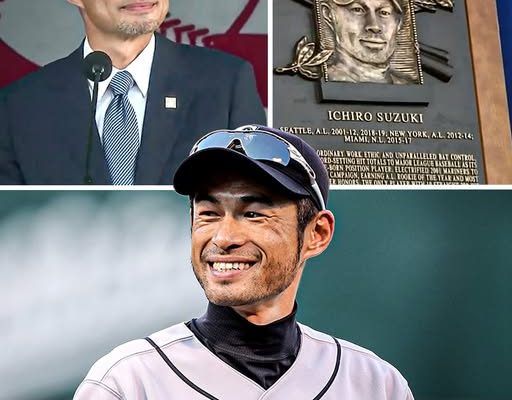In a moment that transcended borders and redefined baseball history, Ichiro Suzuki was officially inducted into the National Baseball Hall of Fame, becoming the first Japanese-born player to receive the sport’s most prestigious honor. For fans across continents, from Seattle to Tokyo, it was not just a celebration of statistics or accolades—it was a tribute to a trailblazer who broke barriers with grace, precision, and unwavering dedication. Ichiro’s induction is more than a personal milestone; it represents the globalization of Major League Baseball and the profound impact one player can have on two baseball-loving nations.
When Ichiro first arrived in Major League Baseball in 2001 at the age of 27, many critics questioned whether his game would translate to America’s top league. Despite a prolific career in Japan’s Nippon Professional Baseball (NPB), skepticism lingered. The differences in pitching styles, season length, and cultural expectations led some to believe he might struggle or fade. Instead, Ichiro shattered those doubts with a rookie season that was nothing short of historic. He led the league in hits and stolen bases, captured both the American League MVP and Rookie of the Year awards, and helped guide the Seattle Mariners to a record-tying 116-win season. It was a debut that announced the arrival of a unique talent and signaled that a new era of global baseball had begun.
Over the next two decades, Ichiro would go on to compile 3,089 MLB hits and another 1,278 in Japan, giving him a combined professional total of 4,367—surpassing even the great Pete Rose. But Ichiro’s greatness wasn’t merely numerical. He brought artistry to the batter’s box, turning slaps into symphonies and line drives into poetry. His swing, compact and swift, was unlike any in the league. He could beat out an infield single or slap an outside pitch into the opposite field with surgical precision. Fielders could guess his direction, but rarely stop him. He made hitting look effortless, yet every swing was the result of tireless work and discipline that traced back to his childhood days in Toyoyama, Japan, where his father, Nobuyuki Suzuki, had him practice with military-like precision.
Ichiro’s fielding was just as iconic as his hitting. With a cannon of an arm and pinpoint accuracy, he turned right field into a no-fly zone. One of his earliest unforgettable MLB moments came when he gunned down Terrence Long at third base with a laser throw from the outfield—a play that left fans and teammates in awe and opponents in stunned silence. He won ten Gold Glove Awards, proving that his impact extended to every corner of the diamond. His glove was not just reliable—it was a weapon.
The significance of Ichiro’s success rippled far beyond the scoreboard. He opened the door for future Japanese and Asian players to make the leap to MLB. Players like Shohei Ohtani, Yu Darvish, and Masahiro Tanaka have all spoken of Ichiro’s influence and how his journey made theirs possible. In many ways, Ichiro carried the hopes of a nation, and with each base hit, he honored those who came before him while blazing a trail for those yet to come.
Ichiro was not a man of many words, but his actions spoke volumes. He approached the game with a reverence that felt almost sacred. His rituals—such as perfectly aligning his batting gloves, bowing to the outfield before taking his position, or sprinting to right field after the national anthem—weren’t just quirks; they were reflections of a man who respected every inch of the game. Even during slumps, he never altered his demeanor. There were no outbursts, no complaints. Only focus, humility, and consistency. In a sport that often celebrates flamboyance, Ichiro’s calm presence was a refreshing paradox: the quietest man on the field was often the most dangerous.
Beyond the stats and records, Ichiro’s cultural impact was immeasurable. In Japan, his games were national events, broadcast live in the early morning hours. Fans rearranged their schedules to watch him bat. Kids mimicked his stance on playgrounds. And when he returned to Japan with the Mariners for the opening series in 2019—his final MLB appearance—the Tokyo Dome roared like a World Series game. He retired that night in emotional fashion, walking off the field to a standing ovation, surrounded by teammates and fans, both American and Japanese, whose tears matched his own.
That moment—one of the most poignant farewells in sports history—foreshadowed the inevitable: a Hall of Fame induction. His credentials were airtight. He owns the MLB record for most hits in a single season (262 in 2004), ten straight 200-hit seasons, and the longest streak of consecutive seasons leading the league in hits. He was a ten-time All-Star, three-time Silver Slugger, and World Baseball Classic MVP. But perhaps his greatest achievement was his ability to make the extraordinary seem routine. He made 200 hits a season feel normal. He made the outfield throw to third look like a casual warm-up. He made greatness feel like a standard.
The Hall of Fame ceremony was filled with familiar faces—former teammates like Ken Griffey Jr., managers, coaches, and even dignitaries from Japan’s baseball federation. But it was Ichiro’s speech that truly stood out. Delivered in English and Japanese, it was humble, heartfelt, and reflective. He spoke of the pressures he faced as a cultural ambassador, the weight of expectations, and the quiet joys of the game. He thanked his family, especially his father, and credited his success to discipline, focus, and love for baseball. There were no grand declarations, no dramatic pauses—just honesty and gratitude. It was Ichiro, through and through.
While Ichiro may have entered Cooperstown as a player, he leaves a legacy that belongs to all of baseball. His name will now forever be etched alongside the greatest to ever play, but his influence cannot be contained within plaques and statistics. It lives on in the thousands of players he inspired, the millions of fans he captivated, and the game itself, which he helped globalize. In a time when baseball has struggled to grow internationally, Ichiro became its most effective ambassador, not by preaching its virtues, but by embodying them.
There’s something poetic about a player whose game was defined by contact and finesse—two traits often overlooked in the power-driven era—earning baseball’s highest honor. In many ways, Ichiro reminded fans what made the game beautiful in the first place. His bat didn’t boom like a slugger’s, but it whispered stories with each hit. His speed didn’t dazzle like a sprinter’s, but it turned routine grounders into moments of electricity. His presence didn’t dominate with volume, but it demanded attention with precision.
Now, as future generations visit the Hall of Fame and encounter Ichiro’s plaque, they’ll learn not only about his records but about what he represented: perseverance, discipline, global unity, and respect for the game. They’ll read about a kid from Toyoyama who dared to dream beyond his borders, and in doing so, changed the sport forever.
Ichiro Suzuki’s induction is not just a recognition of what he did—it’s a celebration of who he was, what he stood for, and the possibilities he created. The Hall of Fame, for all its rich history, feels a little more complete with his presence. And baseball, a game rooted in tradition, feels a little more timeless because of his legacy.



